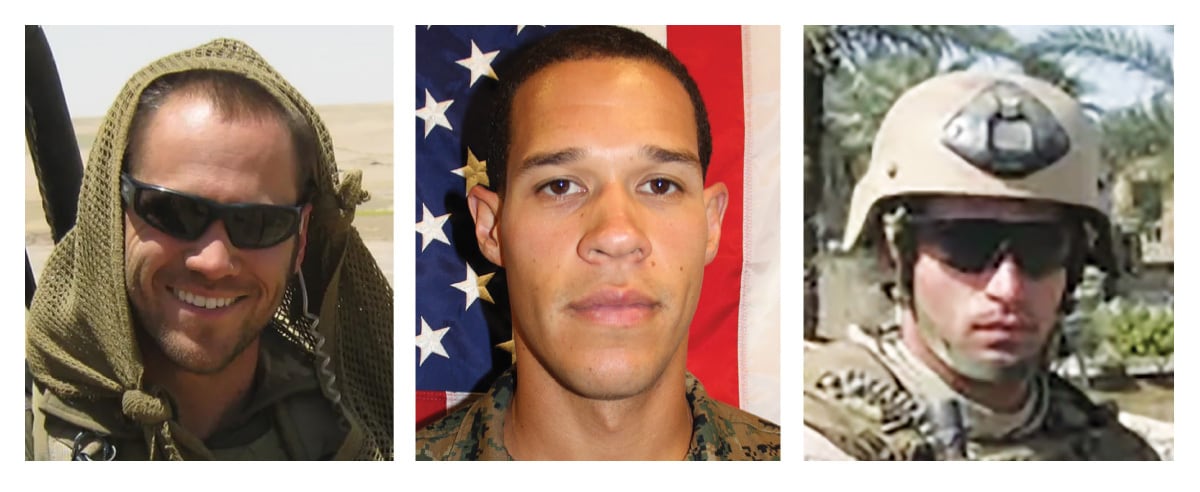Loyalty. Duty. Country. These values matter to me.
As a bomb disposal expert in Afghanistan, I was the tip of the spear: It was my job to find and dispose of improvised explosive devices, or IEDs, and clear the path ahead so that the rest of my platoon could safely do their jobs.
The last IED I found, I discovered with my feet. When the bomb went off, I lost two legs and a finger.
During my lengthy recovery and rehabilitation at Walter Reed Medical Center in Maryland, I knew one thing for certain: I was not going to let my last best days of service to my country be behind me. The same values that guided me on the battlefield compelled me to continue to serve. Now, as the representative for Florida’s 18th District, I’m committed to using my role in Congress to continue to clear the path so my brothers and sisters in arms can do their jobs.
That’s why I recently called on the leader of the U.S. Marine Forces Special Operations Command to drop manslaughter charges against three elite special forces operators who were forced to defend themselves in a clear-cut case of self-defense against an assault from a drunken aggressor.
RELATED

Maj. Gen. James F. Glynn needs to put this unfortunate incident behind MARSOC. He has a chance to right the wrong of his predecessor, Maj. Gen. Daniel Yoo, who seriously damaged the capability and credibility of the command by ignoring the evidence and overzealously ordering the harshest charges and the harshest form of court-martial for the three heroes involved ― a general court-martial.
I’m concerned that these actions were politically motivated, and that the three Marine Raiders ― Marine Gunnery Sgt. Daniel Draher, Marine Gunnery Sgt. Joshua Negron and Navy Hospital Corpsman Chief Petty Officer Eric Gilmet ― have been wrongly scapegoated by Yoo.
Let’s look at the facts.
I’ve personally reviewed multiple surveillance videos that captured the entire event. Here’s what I saw:
In the early morning hours of New Year’s Day 2019, in a civilian pub across the street from the U.S. consulate in Irbil, Kurdistan, a U.S. contractor was repeatedly aggressive toward Gilmet. Several Kurdish bouncers kicked the visibly intoxicated and aggressive contractor out of the bar, but he remained outside near the on-street parking area, seemingly to seek and provoke a violent confrontation.
Draher attempted to de-escalate the situation. He approached the contractor and his eight or nine buddies. He kept his hands at his side, careful to use nonconfrontational body language. The contractor then attacked Draher, landing numerous punches to his face. As the attack continued, Negron stepped in to defend his friend and threw a single punch that rendered the contractor unconscious. Immediately, the hospital corpsman, Gilmet, began providing medical care.
After that, I know that the contractor’s buddies dispersed, so the trio brought him back to the base where all four lived. Gilmet was concerned about his heavily intoxicated state, so he posted watch overnight. In the morning, Gilmet asked the contractor’s friend to keep watch over him. Later, when left alone, the contractor choked on his own vomit and stopped breathing. The friend called for Gilmet, who responded and provided urgent medical care, then helped transport the contractor to the base hospital. Tragically, he died some days later at Landstuhl, Germany.
Immediately after the incident, Draher informed his chain of command of the situation. Then, nearly 10 months later and seemingly out of the blue, Yoo charged Draher, Gilmet and Negron with involuntary manslaughter, negligent homicide, obstruction of justice, dereliction of duty and violation of orders. If convicted, all three would face 22 years in the brig.
There are two questions that must be answered: (1) What motivated Yoo to ignore the overwhelming evidence that his men acted in self-defense; and, (2) What created a judicial environment where unlawful command influence would be perpetrated?
Answering the first question requires some context.
The summer after the episode, the top Navy SEAL sent out a letter stating his command has a problem with discipline “that must be addressed immediately.”
Three days prior, the Navy Times had revealed an internal report exposing cocaine abuse and lax drug testing inside SEAL Team 10. The week before, a platoon from SEAL Team 7 was brought home early from Iraq because of misconduct. This was followed shortly thereafter by a comprehensive culture and ethics review, citing these incidents among others. As a result, commanders sought to publicly restore discipline by holding violators of the laws of armed conflict accountable.
It appears to me that this unfortunate episode got wrapped up in other cases of alleged misconduct within the U.S. Special Operations Command. I believe that Yoo saw an opportunity for damage control and a chance to score political points at the expense of these three heroes. Further, his eagerness suggested to those in his command that no length was too far to travel in pursuit of that goal.
Which brings me to the second question about unlawful command influence within MARSOC.
In February of this year, military judge Navy Cmdr. Hayes C. Larsen dismissed all charges against Gilmet with prejudice ― meaning the charges cannot be refiled ― because Gilmet’s JAG was threatened by a senior JAG.
In his decision, Larsen wrote, “a senior judge advocate who occupied a position of authority over the futures of young judge advocates made threatening comments to a young judge advocate about his career” and that “[h]is actions constitute actual and apparent UCI.”
I am troubled that the government is now appealing this decision. What’s more, the shockingly unlawful judicial culture with the Marine Corps has forced Draher and Negron to release their highly competent Marine JAGs and turn to the Army and Coast Guard for new defense counsel.
Three years on, Glynn must correct these festering wrongs. He has been described by the Commandant of the Marine Corps Gen. David Berger as a “listening and learning leader.”
I believe that Glynn shares my values of loyalty duty, and country. I am confident that he will serve country and Corps by making a swift and just determination in this case by dropping the charges and ensuring these men are honorably treated.
Congressman Brian Mast, R-Florida, is serving his third term representing the 18th Congressional District of Florida. He served in the U.S. Army for more than 12 years as a bomb disposal expert under the Joint Special Operations Command.
The last IED that he found resulted in catastrophic injuries, including the loss of both his legs. He earned a Bronze Star, the Army Commendation Medal for Valor, the Purple Heart Medal and the Defense Meritorious Service Medal.
Have an opinion?
This article is an Op-Ed and as such, the opinions expressed are those of the authors. If you would like to respond, or have an editorial of your own you would like to submit, please email Military Times Senior Managing Editor Kent Miller.
Want more perspectives like this sent straight to you? Subscribe to get our Commentary & Opinion newsletter once a week.





